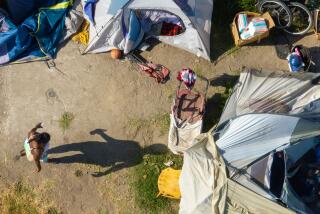Document Fixes Your Stand on Prolonging Life Before It’s an Issue
- Share via
There are words that can change your life:
“Will you marry me?”
“You’re fired.”
“The tumor was benign.”
And in California as well as five other states, there are some even more powerful words--words that can change your death:
“I do not want my life to be prolonged, and I do not want life-sustaining treatment to be provided or continued if the burdens of the treatment outweigh the expected benefits.”
As part of a document called the durable power of attorney for health care, those words--or others that express a different desire--can carry the force of law, speaking for you when you are unable to do so for yourself.
The document, a legally binding version of what is generally known as a “living will,” also allows you to designate someone to make health decisions for you if you become incapable of doing so, and to make provisions for organ donations as well as an autopsy and the disposition of your remains.
Of course, none of us wants to think about such possibilities. But the people at California Health Decisions, a county-based organization formed in 1985 to increase public involvement in health care issues, are hoping we will.
Their goal is to distribute 2 million copies of the form statewide from now to 1995, not just passed out randomly but made available through workshops led by trained volunteers who understand the issues involved, according to Pamela Davidson, who is in charge of the statewide education campaign for durable power of attorney for health care.
The organization is also working with corporations to set up workshops and distribute forms to employees. They have even produced a videotape, “Partners in Health Care: DPAHC,” with the aim of making durable power of attorney for health care a household term.
On the tape, Claudette Smith of Brea tells how she used her husband’s durable power of attorney for health care to prevent paramedics from putting him on support systems. Smith’s husband, Phil, had filled out and signed the form after learning that his lung cancer was terminal. He had designated his wife as his agent, and initialed the paragraph excerpted above, requesting that no extraordinary measures be taken to prolong his life.
“I want my agent to consider the relief of suffering and the quality as well as the extent of the possible extension of my life in making decisions concerning life-sustaining treatment,” the paragraph continues.
The form provides two other choices, one requesting life-sustaining treatment “unless I am in a coma which my doctors reasonably believe to be irreversible,” and another requesting that life be prolonged “to the greatest extent possible without regard to my condition, the chances I have for recovery or the cost of the procedures.”
Those whose desires do not fit any of the three paragraphs may write their own statements or add whatever modifications they choose.
When Phil Smith’s condition worsened, his wife called paramedics to take him to a hospital. When they arrived, he had stopped breathing. As they began trying to resuscitate him and insert a tube in his throat, Barbara Talento, the Smiths’ neighbor and a registered nurse, pointed out that Smith had specifically asked that he not receive such treatment.
“I went and got it,” Claudette Smith says about the signed form. “I waved it at them kind of like a Dracula, you know, ‘Go away!’ ”
At first, the paramedics weren’t sure what to do, because they had never seen a durable power of attorney for health care, she says. But after checking with a supervisor, they agreed to stop resuscitation efforts.
Two other families featured on the tape were not so fortunate. In both cases, even though the families of both patients--one a young accident victim, the other an elderly woman--said they would not want extraordinary life-sustaining treatment, their doctors used every means available to keep the patients alive. The elderly woman spent what her husband called “two weeks of intense suffering” on a respirator before she died, and the young man died only after an appeals judge allowed the disconnection of the feeding tube that had kept him alive for five years.
In 1983, California was the first state to pass legislation authorizing the use of the durable power of attorney for health care. Since then, Arkansas, Idaho, Nevada, Rhode Island and Vermont have followed suit.
Two years later, after thousands of Orange County residents took part in more than 250 grass-roots meetings to voice their concern, the organizers of California Health Decisions decided that explaining and distributing the durable power of attorney for health care were priorities.
“The two issues that people in those groups identified as being most important were maintaining control over their own health care decisions and providing an adequate level of health care for everyone,” says Ellen Severoni, president of California Health Decisions.
Severoni calls the document “the best tool we have for giving people control over their health care choices.”
But in the meetings, she says, “we found that most people had no idea what a durable power of attorney for health care is.”
To make people aware, California Health Decisions not only began conducting workshops but contacted local doctors, hospital administrators and insurance companies, urging them to help make the public more aware of the document.
Newport Beach-based Pacific Mutual Insurance responded by distributing 200,000 copies of the form to its policyholders, along with information on how to use it. Last year, Carl Karcher Enterprises in Anaheim brought in California Health Decisions representatives to conduct workshops on the document for 5,000 employees.
Unlike a living will, the document provides legal protection for the health care agent, physician or other health care provider and hospital or other health care facility against possible lawsuits growing out of a decision not to use every possible means to keep a patient alive.
Even though their patients request that their lives not be prolonged, some doctors are reluctant to adhere to those wishes because they fear such lawsuits from relatives.
With a durable power of attorney, however, the patient’s designated agent has legal authority to require doctors and other health providers to comply with the patient’s stated wishes.
Nineteen statewide organizations, many of them dealing with issues of aging, have joined the California Durable Power of Attorney for Health Care Coalition to help get the forms to the public, according to Davidson.
But she says the elderly are not the only ones who need the document: “Anyone who’s 18 years or older should consider filling out a durable power of attorney for health care, because with the advanced life-support technology we have now, this could be an issue for anyone.”
Before you complete a durable power of attorney for health care, California Health Decisions recommends discussing the issues not only with your family, but with your doctor. Ask the person you would like to designate as your agent whether they are willing to serve in that role.
After you haved signed the document, have it witnessed by two people or notarized, then give copies to your family, your agent, your doctor and hospital. The document will remain valid for seven years, although it can be changed or revoked at any time.
For more information on the durable power of attorney for health care, contact California Health Decisions at (714) 647-4920.
More to Read
Sign up for Essential California
The most important California stories and recommendations in your inbox every morning.
You may occasionally receive promotional content from the Los Angeles Times.










